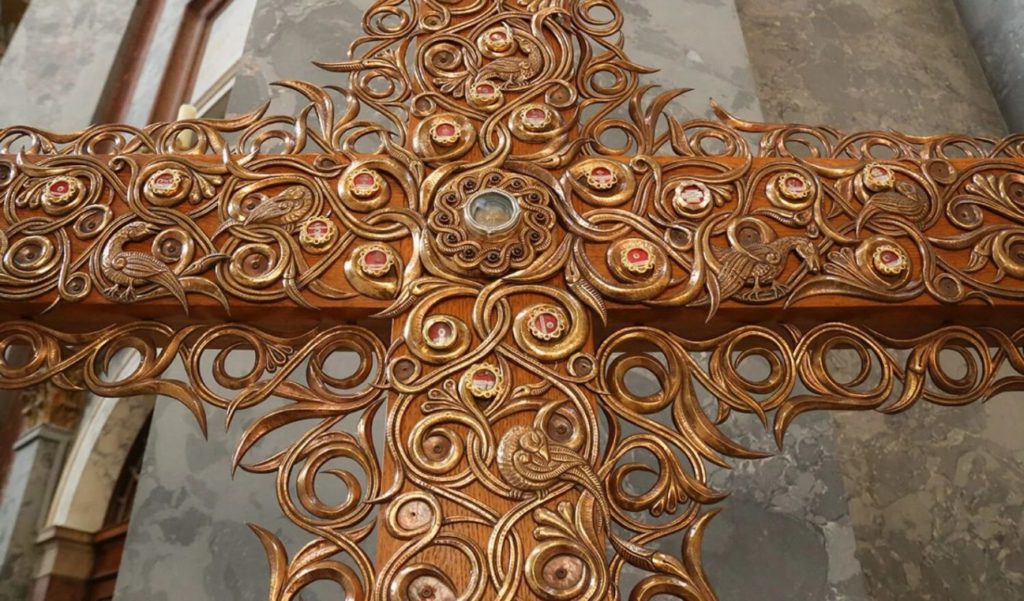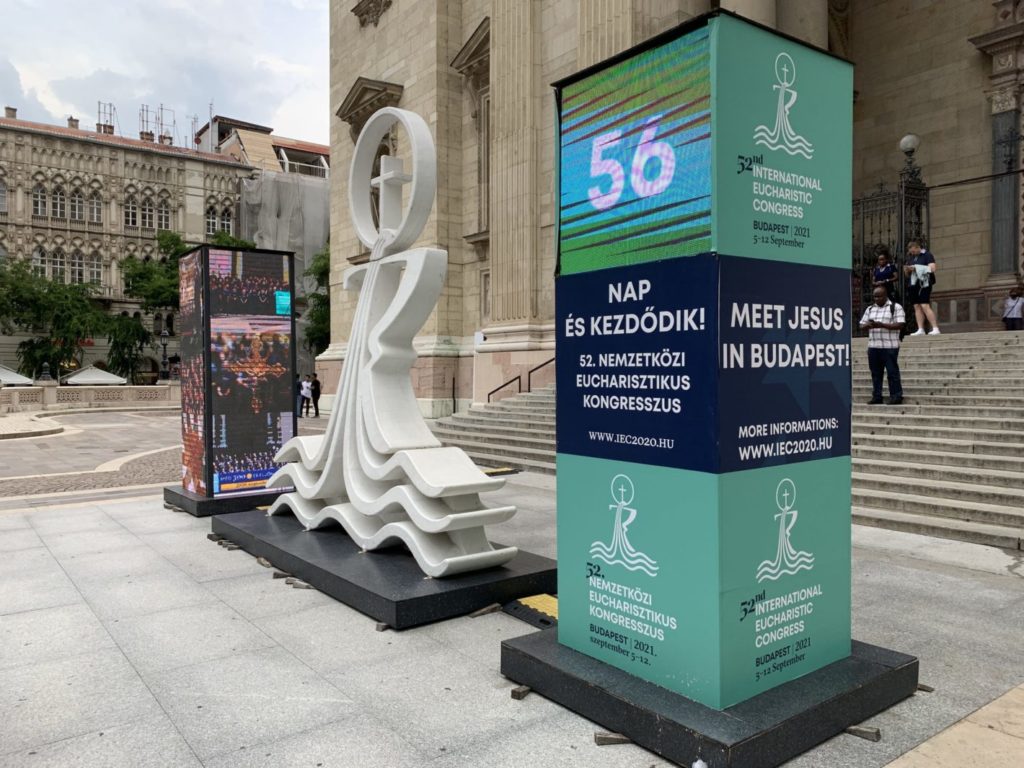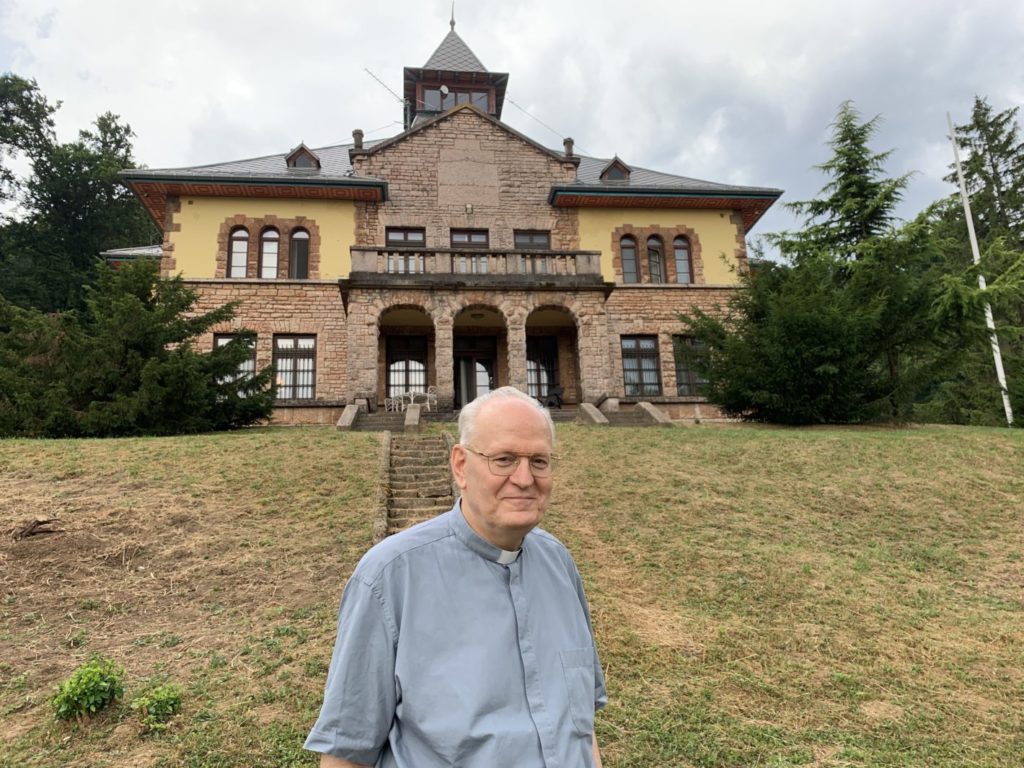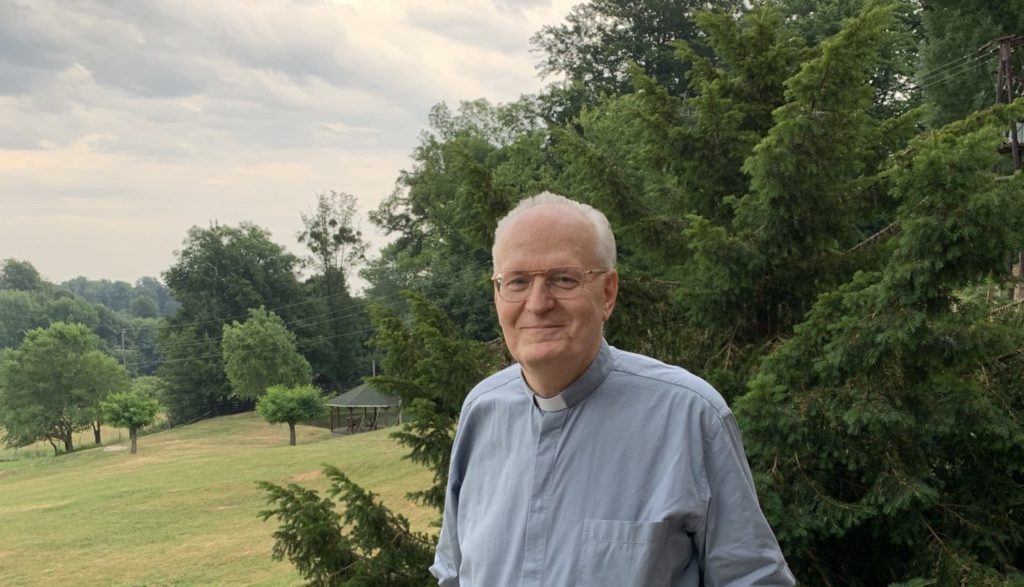With generous availability, Cardinal Péter Erdő, Archbishop of Esztergom-Budapest, received Omnes during his summer break in a house located in the woods surrounding Mount Gerecse, not far from Esztergom, and erected in the 1930s by his predecessor Cardinal Serédy.
The conversation lasted several hours. The immediate motive is the upcoming International Eucharistic Congress in September, with the presence of the Holy Father, but it also includes topics such as the situation of the Church in Hungary, the debates in Europe about Christian values or the emblematic figure of Cardinal József Mindszenty.
We publish now the first part of the conversation. In a few days we will offer the second part.
The Pope will be in Budapest on September 12, on the occasion of the International Eucharistic Congress. Can you comment on the details of the program?
To summarize the program in broad strokes, we know that the Pope will arrive early in the morning of Sunday, September 12, to close the International Eucharistic Congress with a Holy Mass in Heroes' Square. Before that, at the Museum of Fine Arts, he will meet with the President of the Republic János Áder and Prime Minister Viktor Orbán.
He will then meet with the entire Episcopal Conference. He will personally greet each of the bishops and address them. Then he will also meet with the representatives of the Ecumenical Council of Churches in Hungary and of the most important Jewish religious communities. I mention them in the plural, because Judaism is represented in Hungary by various currents. Representatives of the other religious communities, which are very numerous in Hungary, are also invited to the Mass. As for the ecumenical representatives, we do not yet know precisely how many will attend.
As you know, this Congress should have been held in 2020, but the pandemic forced its postponement. I can now highlight the presence at the Congress of the Archbishop of Quito and about ten bishops from Ecuador, where the next Congress will be held in 2024. We look forward to seeing you with affection.
Program of the Pope in Hungary, Sunday, September 12, 2021
06:00 Departure from Rome to Budapest
07:45 Arrival in Budapest and official reception
08:45 Meeting with the President of the Republic and the Prime Minister, at the Museum of Fine Arts, Budapest
09:15 Meeting with the bishops
10:00 Meeting with representatives of the Ecumenical Council of Churches and some Hebrew communities.
11:30 Holy Mass at Heroes' Square
14:30 Farewell ceremony at the airport and departure to Bratislava
How are Hungarian Catholics preparing?
They are preparing spiritually in many ways. There are several activities and convocations with symbolic force, some of which are even personally linked to the Pope. I am referring, for example, to the journey that the Missionary Cross is making around the entire Carpathian Mountains basin, both in Hungary and in neighboring countries.
For believers, Hungarians or non-Hungarians, this Cross has an important meaning, because on it are placed relics of the holy martyrs of our region. Pope Francis blessed it in November 2017, in the Apostolic Palace. It was not easy to get it there, because it is three meters and twenty centimeters high. It is very beautifully decorated, and full of symbolism. It is the work of Csaba Ozsvári, a very good Hungarian artist, deeply believing.

The Cross is being carried on a missionary itinerary, and wherever it arrives, prayer meetings and talks on the lives of the saints whose relics it bears are organized. Among them are very ancient saints, such as St. Martin of Tours, who was born in Pannonia, and other saints from the time of the Christianization of these lands, from St. Adalbert to St. Stephen, as well as the new martyrs of the 20th century, of whom there are many. For example, it contains relics of the seven martyred bishops that Pope Francis beatified in Romania in 2019, or of Blessed Zoltán Meszlényi, who was auxiliary bishop of our archdiocese, first with Cardinal Seredy and then with Cardinal Mindszenty, and died in prison in 1951; or like Sister Sára Salkaházi. This nun was murdered at the end of 1944 on the bank of the Danube, for having hidden a group of Jewish women in her convent in Budapest, together with the people she had helped.
The Missionary Cross has an important meaning, because it contains relics of the holy martyrs of our region.
Cardinal Péter ErdőArchbishop of Esztergom-Budapest
To the extent that some of them are preserved - which is not easy in the case of some of the modern martyrs - the relics of all these people are on that Cross. As a reference for the mission, therefore, it is very important.
Not long ago I was in Zreñanin, in Serbia, where the Cross was on display in the cathedral; and more recently in Bácsfa-Szentantal, a place in Slovakia where a festive gathering of Hungarians living there was being held, where the Cross was also on display. There were some computers available for the attendees to register for the Eucharistic Congress, and the interest was noticeable.
The Pope's visit is "a sign of hope" for Hungary, you said. In what sense?
For the past year and a half it has been impossible to hold large religious gatherings. The fact that we now have the opportunity to attend the Eucharistic celebration in large numbers during the Congress is in itself a great feast.
The faithful are already hungry for the Eucharist. We have seen it in various ways. Thank God, when I ordained new priests and deacons in Esztergom in June this year, the basilica was full. That means that people want to celebrate together. They perceive well the difference between an online streamed Mass and real participation in the Mass. Of course, during the pandemic we studied well the possibility of telematic transmissions, and almost all parishes have organized them, but now that we can freely go to Mass again we recommend that Masses and other religious programs no longer be retransmitted.
However, we have learned a lot about this point.
The fact that we already have the opportunity to attend the Eucharistic celebration in large numbers during the Congress is in itself a great feast. The faithful are already hungry for the Eucharist.
Cardinal Péter ErdőArchbishop of Esztergom-Budapest
As early as 1938, a Eucharistic Congress was held in Budapest...
That International Eucharistic Congress of 1938 was a dramatic event. We have preserved the hymn of the Congress, a song that became well known and was sung in all the churches. In 2019, at the Mass with the Pope in Mercurea Ciuc (Csíksomlyó, in Romania), a crowd of hundreds of thousands of people sang it during the Mass; they knew by heart all the lines of the text. That is to say, its memory had remained in the believing community.
What was the great strength that year? The last phrase of the hymn, which was a prayer that God would unite in peace all the peoples and nations of the earth. And that was already on the eve of the Second World War. So much so that from Germany and Austria they could not come, because Hitler expressly forbade participation. The Hungarians knew that many Catholics would have liked to come but could not. The Catholic Church has its own identity, clearly visible beyond nationalisms. The centrality of the Eucharist was very much emphasized, and one could count on the sympathy and a certain participation of the other Christians of the country. In this sense, the 1938 Congress was a unifying event.

The theme of the September Congress is taken from Psalm 87, "All my sources are in you". What does it indicate?
Psalm 87 points to the centrality of the Eucharist. The Second Vatican Council emphasized that the liturgy in general, and principally the Eucharist, is "fons et culmen," the source and summit of the Church's mission and of the whole Christian life.
The song of Psalm 87 speaks about Jerusalem. When a Christian reads this text, he undoubtedly thinks of the heavenly Jerusalem, so that the whole text takes on an eschatological meaning. It also says textually that all peoples will converge there, even those who are enemies among themselves. They will all say: "We too have been born there", and full of joy they will sing and dance together, proclaiming: "All my springs are in you". In other words, divine grace, the Eucharist, is the source of life and reconciliation for all peoples. In this sense, the quotation from Psalm 87 has a sense of timeliness and an eschatological meaning.
And how do non-Catholics receive the Pope?
I would say positively. This is shown by the many letters I have received. Everyone wants the Pope to visit their home, their church, their event, somewhere in the country. Naturally it is not possible for him to go everywhere, but there is interest, and a desire to meet.
Let's talk about Hungary receiving the Pope. It seems that in the country there is a practical religiosity, but also a widespread secularization. Is that so?
In recent decades, the bishops of our region have reflected many times, and among other things we have asked ourselves the question of the way in which secularization presents itself here. We have come to the conclusion that it is not just a phenomenon like secularization in the West, but that it has its own forms. Of course, the consumer and entertainment society was also present here, as well as a distancing from the religious world, but at the same time there were typical manifestations of the communist epochs. This specific secularization was strong in the former Central European socialist countries, and even more so in the Soviet Union.
It is a different human approach, very flat, very horizontalist, but without great ideologies. More than a current of thought, what conditioned many was materialistic superficiality. To this approach came to be added the possibility of consumption, and the official state Marxist-Leninist ideology declined. Those who did not have a strong personal ideological conviction -since having one has always been a privilege of the few- and those who were not personally religious, fell into an ethical and ideological vacuum.
In Hungary secularization is not the same as secularization in the West, but has its own forms, with manifestations typical of the communist eras. It is a different human approach, very flat, very horizontalist, but without great ideologies. More than a current of thought, what conditioned many was materialistic superficiality.
Cardinal Péter ErdőArchbishop of Esztergom-Budapest
The consequence was that these societies began to criminalize. When there are no values and there is a lack of internal norms and even external norms are shaky, and we want to live better on the basis of material goods, we try to achieve it. In all these countries the political class understood that they had to do something to prevent it, and with that aim they decided to go back to supporting the traditions proper to the different peoples, including religious traditions. It was the return to Orthodoxy in Russia or Romania, for example, or to other religions, and to national traditions and values. Admittedly, the Western countries and their media also strongly promoted national sentiments in the communist world, because they thought that this would weaken communist internationalism.

After the fall of communism, on the other hand, other voices began to be heard from the West saying: religion, values, cultural traditions... are of no interest. Not all peoples accepted this equally, and there were difficulties. But it is clear that in these countries, especially more towards the East, but also in our region, religion had a different meaning than it had in the Western world.
Hungarian society is now quite strongly secularized, although perhaps less so than in the Czech Republic or the former German Democratic Republic. Statistics on the reception of the sacraments today show data similar to those of the mid-1980s. The big difference is that today all the Churches, all the religions, are much stronger institutionally. Various institutions, schools, homes for the elderly, etc., have been returned to them. But that required a lot of work, and it was a very important challenge for us. In spite of all the efforts we made for the good of souls, we were not able to achieve visibly (the fruits cannot be measured statistically) much more than before. It was necessary to take them on because of a change of structures that we had not decided, but was determined by the politics of the different countries. In that situation, we could not wish for what we thought was best.
Nevertheless, we must continue to work towards the same goal. In the meantime, of course, competition has grown within the framework of religious freedom.








